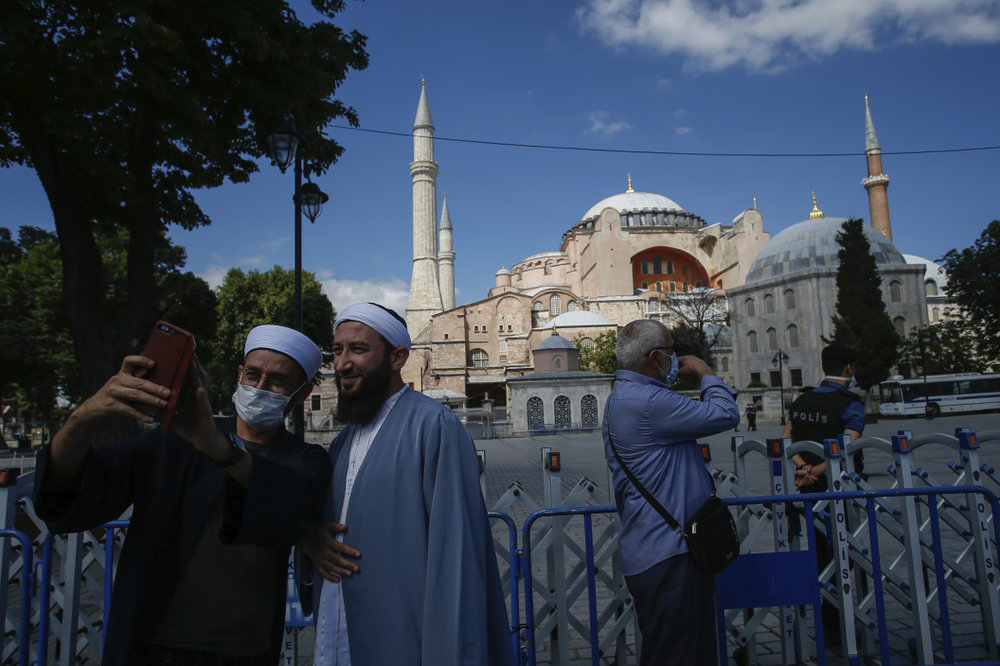By: AP Staff
Turkey’s foreign minister on Tuesday chided the European Union over its condemnation of a Turkish decision to convert Istanbul’s iconic Hagia Sophia from a museum to a mosque, saying the matter is an issue of national sovereignty.
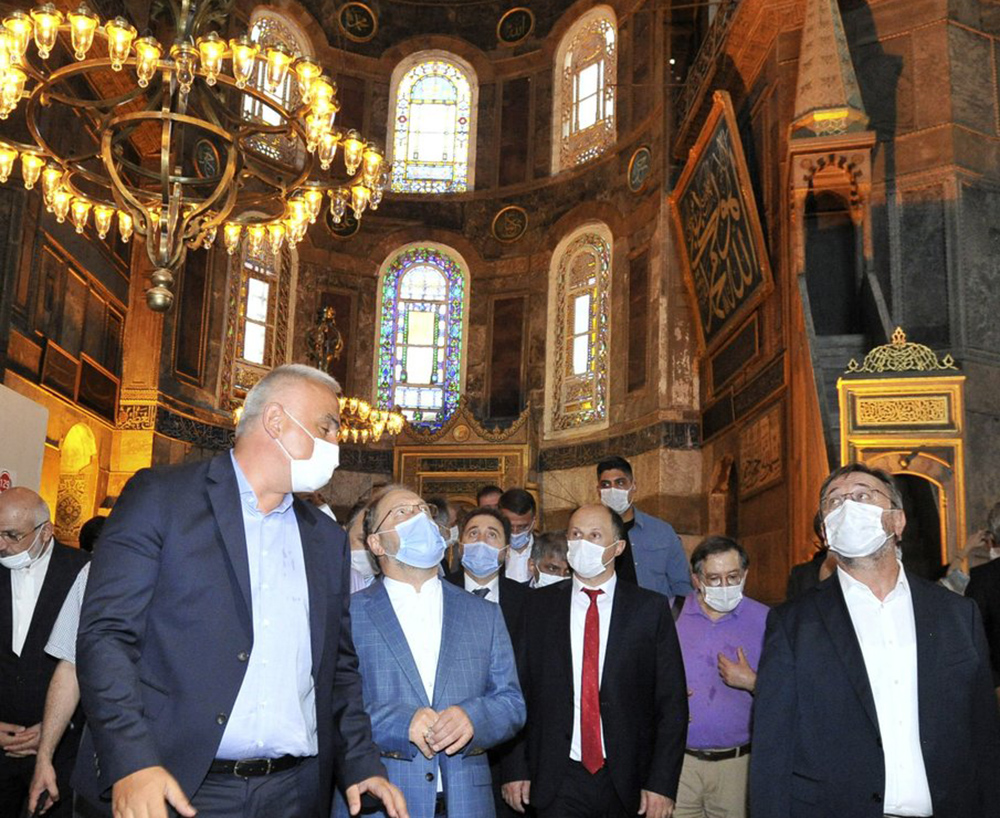
Last week, Turkey canceled the sixth-century former cathedral-turned-mosque’s 86-year status as a museum and said it would open for Muslim worship as of July 24.
The decision sparked criticism in the United States, Greece, and other Western countries as well as from Orthodox Christian leaders. Pope Francis expressed sadness over the move.
EU foreign ministers, holding their first face-to-face meeting in months on Monday, declared that they “condemned” the decision. EU foreign affairs chief Josep Borrell said there was “broad support to call on the Turkish authorities to urgently consider and reverse this decision.”
Asked to comment on the EU criticism, Foreign Minister Mevlut Cavusoglu told a joint news conference with his visiting Maltese counterpart: “We reject the word ‘condemnation.’”
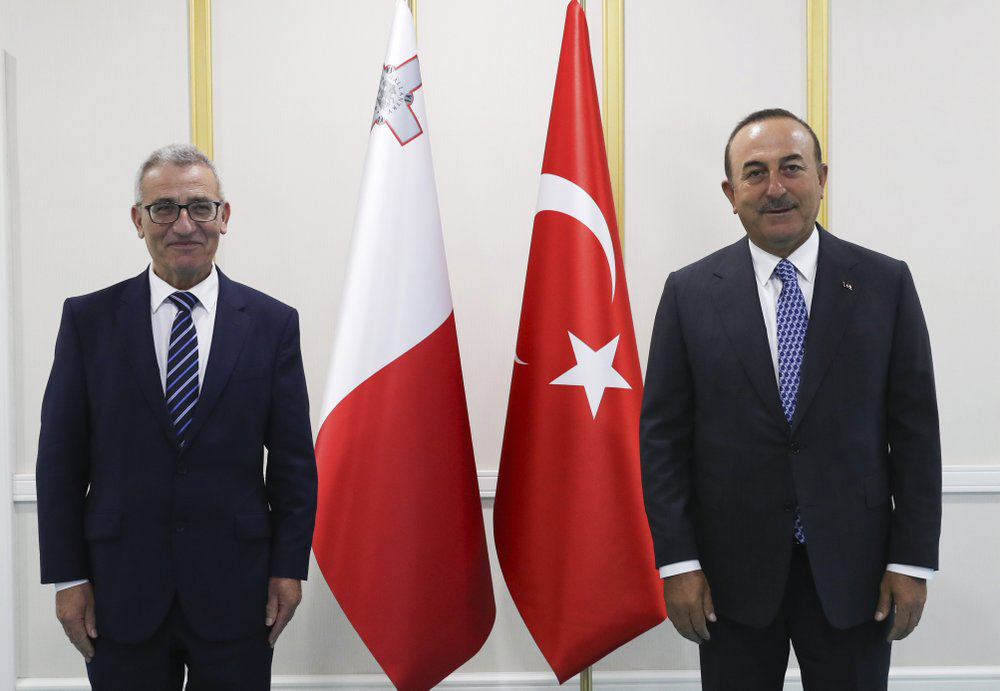
“This is a matter that concerns Turkey’s sovereign rights,” he said.
He argued that there were several mosques in EU-member Spain that had been converted into churches.
On Tuesday, Greece again expressed dismay at Turkey’s decision.
“This decision is certainly painful to us as Greek Orthodox Christians but it also hurts us as citizens of the world,” said Greek Prime Minister Kyriakos Mitsotakis. “This is not a Greek-Turkish issue, it is not even a Euro-Turkish issue, it is global. It is a universal issue.”
Mitsotakis added: “With this setback, Turkey is choosing to sever ties with the Western world and its values. It abandons a cultural direction of many centuries, preferring introversion. And it wraps with an artificial mantle of strength over its weakness.”
Meanwhile, officials from Turkey’s religious affairs authority, said the landmark structure can remain open to visitors outside of prayer hours, the state-run Anadolu Agency reported.
The Christian depictions inside are no obstacle to Muslim prayers, said the officials who are preparing the site for Muslim worship. They added however, that the figures would need to be covered with curtains or through other means during the prayers, in line with Islamic traditions that prohibit such representations.
Turkey and the European Union clashed on Monday over Ankara’s decision to change the status of Hagia Sophia from a museum to a mosque and its continued energy exploration in disputed Mediterranean waters.
After their their first face-to-face meeting in months, the 27 EU foreign ministers said that they “condemned the Turkish decision to convert such an emblematic monument as the Hagia Sophia,” EU foreign affairs chief Josep Borrell said.
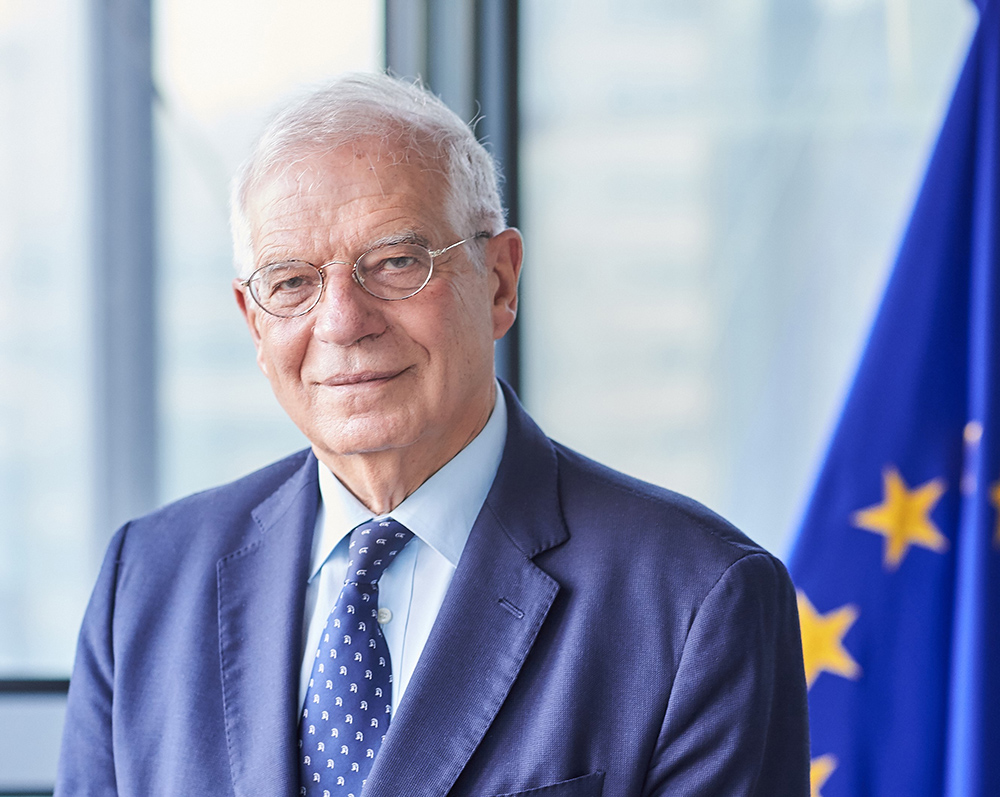
“This decision will inevitably fuel the mistrust, promote renewed division between religious communities and undermine our efforts at dialog and cooperation,” he said after the meeting of EU foreign ministers.
He said there was “broad support to call on the Turkish authorities to urgently consider and reverse this decision.” Hagia Sophia was originally built in Istanbul as a Christian cathedral, and the pope and others have expressed their sadness and criticism of the move by President Recep Tayyip Erdogan.
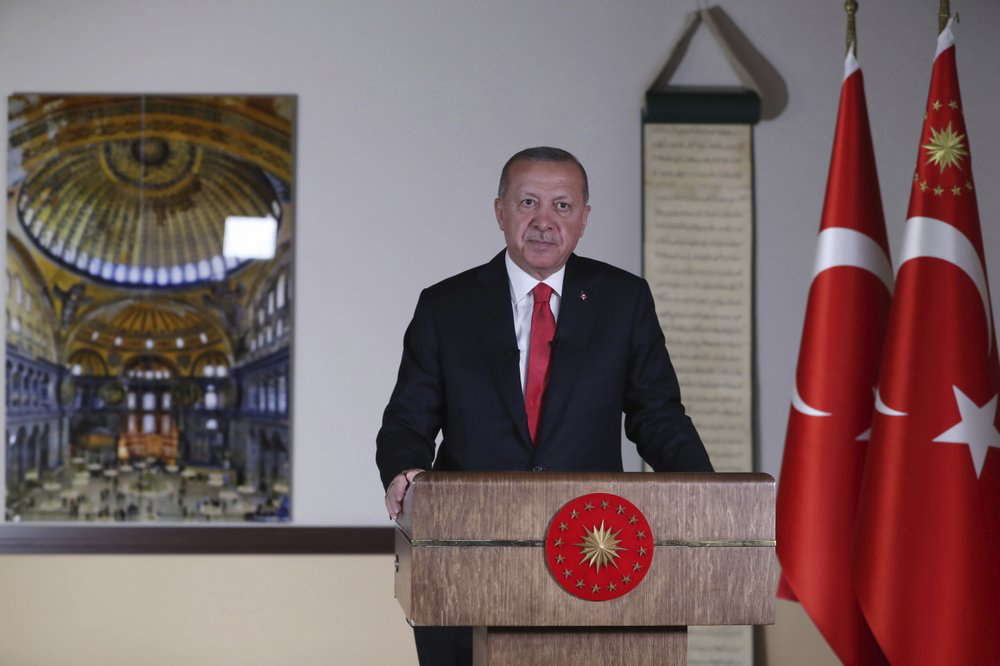
Greek government spokesman Stelios Petsas said Monday that the EU was “faced with a challenge and insult” meted out by Erdogan.
Turkish Foreign Minister Mevlut Cavusoglu hit back and rejected international intervention concerning its decision to convert Hagia Sophia back into a mosque.
“Hagia Sophia was left as a legacy as a mosque and must be used as a mosque,” Cavusoglu told state broadcaster TRT. “We strongly reject comments that amount to an intervention in Turkey’s sovereign rights.”
Borrell was in Turkey last week where he also discussed Ankara’s disputes with Greece and Cyprus over energy exploration in the eastern Mediterranean region. Turkey has dispatched warship-escorted vessels to drill for gas in an area where Cyprus insists it has exclusive rights. The Turkish government has said it’s acting to protect its interests in the area’s natural resources and those of Turkish Cypriots.
Petsas said that Turkish drilling was blatantly contrary to international obligations and international law” and said that Greece would be looking to prepare a list for possible “political, diplomatic and financial” sanctions.
Again, Cavusoglu stood firm.
“If Greece were to turn away from its maximalist ways and agree to a fair sharing (of rights), and if it were to convince Cyprus to a fair sharing of revenues (from the exploration of natural resources), then 80% of our problems would solved,” Cavusoglu said.
Borrell said there were no immediate decisions at Monday’s meeting but that the ministers would revisit the issue at their next meeting in Berlin in August.
Even as the rift between both sides was deepening, the 27 EU ministers couldn’t get that close among themselves either. It was their first in-person meeting since the coronavirus lockdown set in, but because of social distancing rules, there was only room for lots of elbow bumping for a greeting and little reading of lips, since ministers were wearing masks around the meeting table.
Pope Francis said on Sunday that he is “deeply pained” over the decision by Turkey to change the status of Hagia Sophia — which was originally built in Istanbul as a Christian cathedral — from a museum to a mosque.
In a very brief, improvised remark, Francis, speaking from his studio window overlooking St. Peter’s Square, noted that the Catholic Church marked Sunday as International Day of the Sea. “And the sea brings me a little far away with my thought: to Istanbul,” the pontiff said. “I am thinking of St. Sophia and I am deeply pained.”
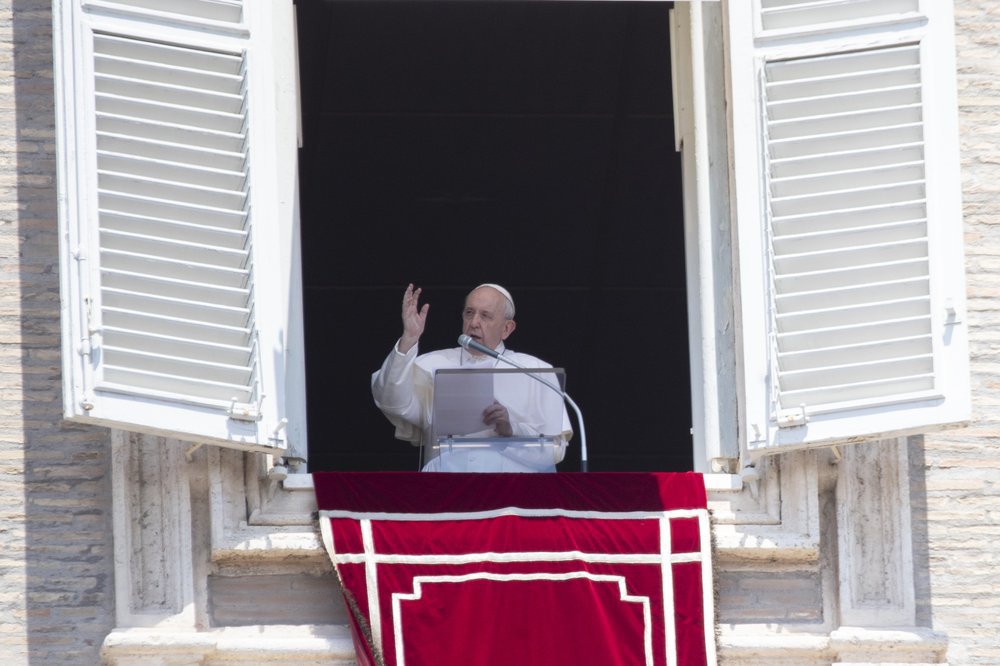
Francis said no more but was clearly referring to the move by Turkish President Recep Tayyip Erdogan to formally convert the monumental building back into a mosque. The colossal Santa Sophia cathedral was turned into a mosque after the Ottomans conquered the city in 1453. The Turkish secular government in 1934 decided to make it a museum.
The pope, who heads the Roman Catholic church, is adding his voice to strong objections a day earlier by the head of the Geneva-based World Council of Churches. That organization described its “grief and dismay” in noting that Hagia Sophia has been “a place of openness, encounter and inspiration for people from all nations.” The council’s membership comprises Protestant, Orthodox and Anglican churches.
Erdogan declared the monument open for Muslim worship after a high court annulled the 1934 government decision.
The head of the World Council of Churches has written to Turkey’s president expressing his “grief and dismay” over Turkey’s decision to change the status of Istanbul’s landmark Hagia Sophia from a museum to a mosque.
As a World Heritage museum, “Hagia Sophia has been a place of openness, encounter and inspiration for people from all nations,” interim secretary general Ioan Sauca said in the letter released Saturday by the Geneva-based group.
The colossal Hagia Sophia was built 1,500 years ago as an Orthodox Christian cathedral and was converted into a mosque after the Ottomans conquered Constantinople, now Istanbul, in 1453. The secular Turkish government decided in 1934 to make it a museum, and millions of tourists now visit the landmark annually.
Sauca said the museum status had been “a powerful expression” of Turkey’s commitment to inclusion and secularism. He urged Erdogan to reconsider the decision “in the interests of promoting mutual understanding, respect, dialogue and cooperation, and avoiding cultivating old animosities and divisions.”
The WCC says its membership comprises 350 Protestant, Orthodox and Anglican churches with some 500 million believers.
Erdogan, a devout Muslim, has frequently used the debate over Hagia Sophia to drum up support for his Islamic-rooted party. The decision has provoked deep dismay among Orthodox Christians and strong criticism from neighbor and rival Greece.
French Foreign Minister Jean-Yves Le Drian also said France “deplores” Turkey’s decision on Hagia Sophia.
“These decisions cast doubt on one of the most symbolic acts of modern and secular Turkey,” the minister said in a statement.
“The integrity of this religious, architectural and historic jewel, a symbol of religious freedom, tolerance and diversity, listed as a UNESCO World Heritage Site, must be preserved,” he said. “Hagia Sophia must continue to represent the plurality and diversity of religious heritage, dialogue and tolerance.”
The State Department has said it was “disappointed” by the decision and looks forward to seeing how Turkey plans to keep the landmark open to all.
In related developments, a few days ago, Turkey’s parliament passed controversial legislation amending laws governing attorneys and bar associations on Saturday, despite protests from critics who say the move could limit the independence of lawyers and reduce the professional associations’ clout.
The new law, submitted by President Recep Tayyip Erdogan’s party, was passed after days of heated debate and following scuffles between police and lawyers protesting the legislation.
The government has said the law would create a “more democratic and pluralistic” system. But detractors say the measure aims to lessen the influence of major bar associations that have been outspoken critics of Erdogan’s government and have documented rights violations.
The change comes amid widespread criticism of the independence of the judiciary and the rule of law in Turkey.
The law allows multiple bar associations to be established if at least 2,000 lawyers apply in provinces with more than 5,000 lawyers. It also scraps proportional representation of bars in the national umbrella organization, in effect decreasing the number of delegates from Turkey’s major cities, which could reduce their funding.
The law would affect the three major bar associations of Istanbul, Ankara and Izmir.
The main opposition Republican People’s Party, or CHP, has vowed to ask Turkey’s Constitutional Court’s abolish it. Ozgur Ozel, a top lawmaker from the party, said Friday the law was an “unmatched level of malignancy” aiming to “prune” lawyers’ power for defense. He slammed the government for excluding the lawyers from debate.
The legislation has sparked weeks of protests by the bar associations. In June the heads of 80 associations marched to the capital Ankara where they were met with police barricades. Thousands of lawyers protested outside Istanbul’s main courthouse when the bill was presented to parliament. Bar association leaders waited for days outside parliament to be allowed into committee meetings where the draft law was discussed. Officials banned or dispersed other protests citing the COVID-19 pandemic.
Ruling party lawmakers pushing the bill said nearly 128,000 lawyers working in Turkey needed more bar associations to get support and training. Officials say the amendment ensures “justice in representation,” requiring all provincial association to send an equal number of delegates and an additional delegate for every 5,000 lawyers.
The ruling party introduced the bill after the Ankara Bar Association accused the head of the Religious Affairs Presidency of inciting hatred against homosexuals and called for his removal from office. Erdogan, a devout Muslim, came to the official’s defense and slammed the Ankara lawyers.
Human Rights Watch called the law “politically divisive” in a report this week.
“While the creation of rival bar associations in cities might at face value seem to offer lawyers a greater choice over which professional body to join, the government’s own statements about the plan and the timing and means by which it is being introduced demonstrate a political purpose unrelated to legitimate efforts to advance or strengthen standards in the legal profession,” the rights group said.
(AP)




